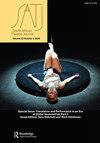Translation and performance in an era of global asymmetries
IF 0.2
0 THEATER
引用次数: 1
Abstract
The articles in this special issue, and another that will follow in the next issue, arise from a three-year research project that brought together researchers and practitioners of theatre and performance from South Africa, India and the Netherlands to focus on translation and performance, particularly in a context of global power asymmetries and discontinuities. The project was generously funded by the National Research Foundation of South Africa with additional funding from the University of Cape Town, the Amsterdam Centre for Globalisation Studies and the Netherlands Institute of Cultural Analysis. The focus in the project was not so much translation in the linguistic sense, in which it is most commonly understood (although it did not ignore this aspect either). Rather, the focus was on translation in its root sense of ‘a carrying over’ across a much broader range of semiotic, sensory and inter-subjective forms and practices, including the conveying of gestures, styles, dramaturgy, and genres, moving across media, historical periods, cultural contexts and physical spaces. The field of translation studies has opened up in recent times broadly speaking ‘from textual to cultural translation, or from the translation of language to the translation of action’ (Bachmann-Medick 2009, p. 5). While Homi Bhabha’s concept of the ‘translational transnational’ in his book The Location of Culture (1994, p. 173) is an obvious, high profile and influential example, there have been a whole host of areas that have been investigated through the lens of translation since the turn of the millennium. A sample of these studies and areas would include migration as a form of translational action (Papastergiadis 2000); violence and translation (Das 2002); translating terror (Bassnett 2005); translation and conflict (Baker 2006). Our project took shape against the backdrop of two broad processes at work in the world that could be seen as both generally applicable to all contexts and specifically applicable to South Africa: globalization and post-apartheid. We would suggest that these two processes taken together could be described as forming one of the key social questions globally today. What has become known as globalization – the vast interconnection of peoples, economies, political processes with its intensive migratory and intercultural consequences – requires of us to engage in active and urgent ways with the challenge of being together rather than being kept apart or keeping ourselves apart. If the period we are living through in South Africa today is truly post-apartheid then in a very literal sense the project we must be engaged in is that which lies beyond separateness. It is the project of trying to ‘be together’. While this is obviously apparent in the South African context it is not limited to it. In the context of Europe, the recent resurgence of a racialized underpinning of national identity in different European societies alerts us both to the infinite translatability of the phenomenon of fascism as well as to the importance of a continual recalibration of translation towards the goals of a radical planetarity, rather than a narrow and aggressive, racially coded cultural determinism (Gilroy 2019). In India, alarming levels of socio-economic disparities全球不对称时代的翻译与表演
本期特刊以及下期特刊的文章源于一个为期三年的研究项目,该项目汇集了来自南非、印度和荷兰的戏剧和表演研究人员和从业者,重点关注翻译和表演,特别是在全球权力不对称和不连续性的背景下。该项目由南非国家研究基金会慷慨资助,开普敦大学、阿姆斯特丹全球化研究中心和荷兰文化分析研究所也提供了额外资金。项目的重点并不是语言意义上的翻译,这是最常见的理解(尽管它也没有忽视这方面)。相反,重点是翻译的根本意义,即在更广泛的符号学、感官和主体间形式和实践中“传递”,包括手势、风格、戏剧和流派的传递,跨越媒体、历史时期、文化背景和物理空间。近年来,翻译研究领域已经广泛地从“文本翻译到文化翻译,或者从语言翻译到行动翻译”(Bachmann-Medick 2009,第5页)。而霍米·巴巴(Homi Bhabha)在其著作《文化的定位》(1994,第173页)中提出的“跨国翻译”概念是一个明显的、引人注目的、有影响力的例子。自世纪之交以来,通过翻译的视角研究了许多领域。这些研究和领域的一个样本将包括作为一种转化行动形式的迁移(Papastergiadis 2000);暴力与翻译(Das 2002);翻译恐怖(Bassnett 2005);翻译与冲突(Baker 2006)。我们的项目是在世界上正在起作用的两个广泛进程的背景下形成的,这两个进程可以被视为既普遍适用于所有情况,又特别适用于南非:全球化和后种族隔离。我们认为,这两个过程合在一起可以被描述为形成当今全球的关键社会问题之一。所谓的全球化- -人民、经济、政治进程的广泛相互联系及其严重的移徙和文化间后果- -要求我们以积极和紧迫的方式参与共同而不是分开或使我们自己分开的挑战。如果我们今天在南非经历的时期确实是后种族隔离时期,那么从字面意义上讲,我们必须从事的项目是超越分离的项目。这是一个试图“在一起”的项目。虽然这在南非的情况下是显而易见的,但它并不局限于此。在欧洲的背景下,最近在不同的欧洲社会中,民族认同的种族化基础重新抬头,这既提醒我们法西斯主义现象的无限可译性,也提醒我们不断调整翻译的重要性,以实现一个激进的星球的目标,而不是狭隘的、侵略性的、种族编码的文化决定论(Gilroy 2019)。在印度,社会经济差距惊人
本文章由计算机程序翻译,如有差异,请以英文原文为准。
求助全文
约1分钟内获得全文
求助全文

 求助内容:
求助内容: 应助结果提醒方式:
应助结果提醒方式:


